Psychology Assignment: Quizzes on Addiction, Church, and Eating
VerifiedAdded on 2023/03/17
|7
|1571
|57
Homework Assignment
AI Summary
This psychology assignment presents answers to four quizzes. Quiz 1 explores major risk factors influencing addiction, including abuse, social problems, individual variables, and family problems. Quiz 2 examines the relationship between substance abuse, dependency, and sin, referencing Butman's perspectives. Quiz 3 discusses the church's role in supporting older individuals, emphasizing spiritual development and community. Finally, Quiz 4 addresses eating disorders, presenting a dualistic view of individuals and the church's role in preventing these disorders, including the impact of self-objectification and biblical interpretations.

Running head: Psychology 1
Psychology
Name
Professor
Institution
Course
Date
Psychology
Name
Professor
Institution
Course
Date
Paraphrase This Document
Need a fresh take? Get an instant paraphrase of this document with our AI Paraphraser
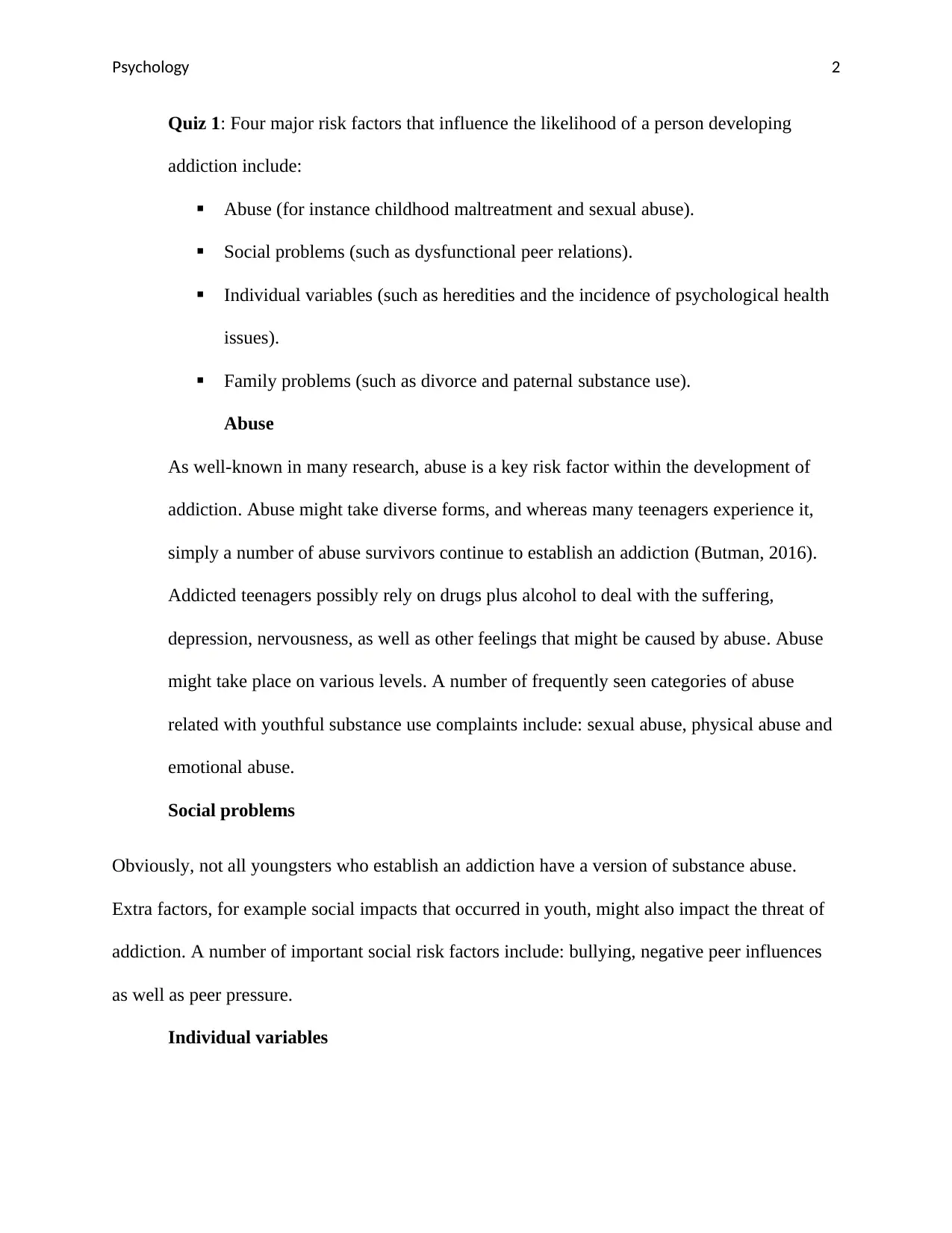
Psychology 2
Quiz 1: Four major risk factors that influence the likelihood of a person developing
addiction include:
Abuse (for instance childhood maltreatment and sexual abuse).
Social problems (such as dysfunctional peer relations).
Individual variables (such as heredities and the incidence of psychological health
issues).
Family problems (such as divorce and paternal substance use).
Abuse
As well-known in many research, abuse is a key risk factor within the development of
addiction. Abuse might take diverse forms, and whereas many teenagers experience it,
simply a number of abuse survivors continue to establish an addiction (Butman, 2016).
Addicted teenagers possibly rely on drugs plus alcohol to deal with the suffering,
depression, nervousness, as well as other feelings that might be caused by abuse. Abuse
might take place on various levels. A number of frequently seen categories of abuse
related with youthful substance use complaints include: sexual abuse, physical abuse and
emotional abuse.
Social problems
Obviously, not all youngsters who establish an addiction have a version of substance abuse.
Extra factors, for example social impacts that occurred in youth, might also impact the threat of
addiction. A number of important social risk factors include: bullying, negative peer influences
as well as peer pressure.
Individual variables
Quiz 1: Four major risk factors that influence the likelihood of a person developing
addiction include:
Abuse (for instance childhood maltreatment and sexual abuse).
Social problems (such as dysfunctional peer relations).
Individual variables (such as heredities and the incidence of psychological health
issues).
Family problems (such as divorce and paternal substance use).
Abuse
As well-known in many research, abuse is a key risk factor within the development of
addiction. Abuse might take diverse forms, and whereas many teenagers experience it,
simply a number of abuse survivors continue to establish an addiction (Butman, 2016).
Addicted teenagers possibly rely on drugs plus alcohol to deal with the suffering,
depression, nervousness, as well as other feelings that might be caused by abuse. Abuse
might take place on various levels. A number of frequently seen categories of abuse
related with youthful substance use complaints include: sexual abuse, physical abuse and
emotional abuse.
Social problems
Obviously, not all youngsters who establish an addiction have a version of substance abuse.
Extra factors, for example social impacts that occurred in youth, might also impact the threat of
addiction. A number of important social risk factors include: bullying, negative peer influences
as well as peer pressure.
Individual variables
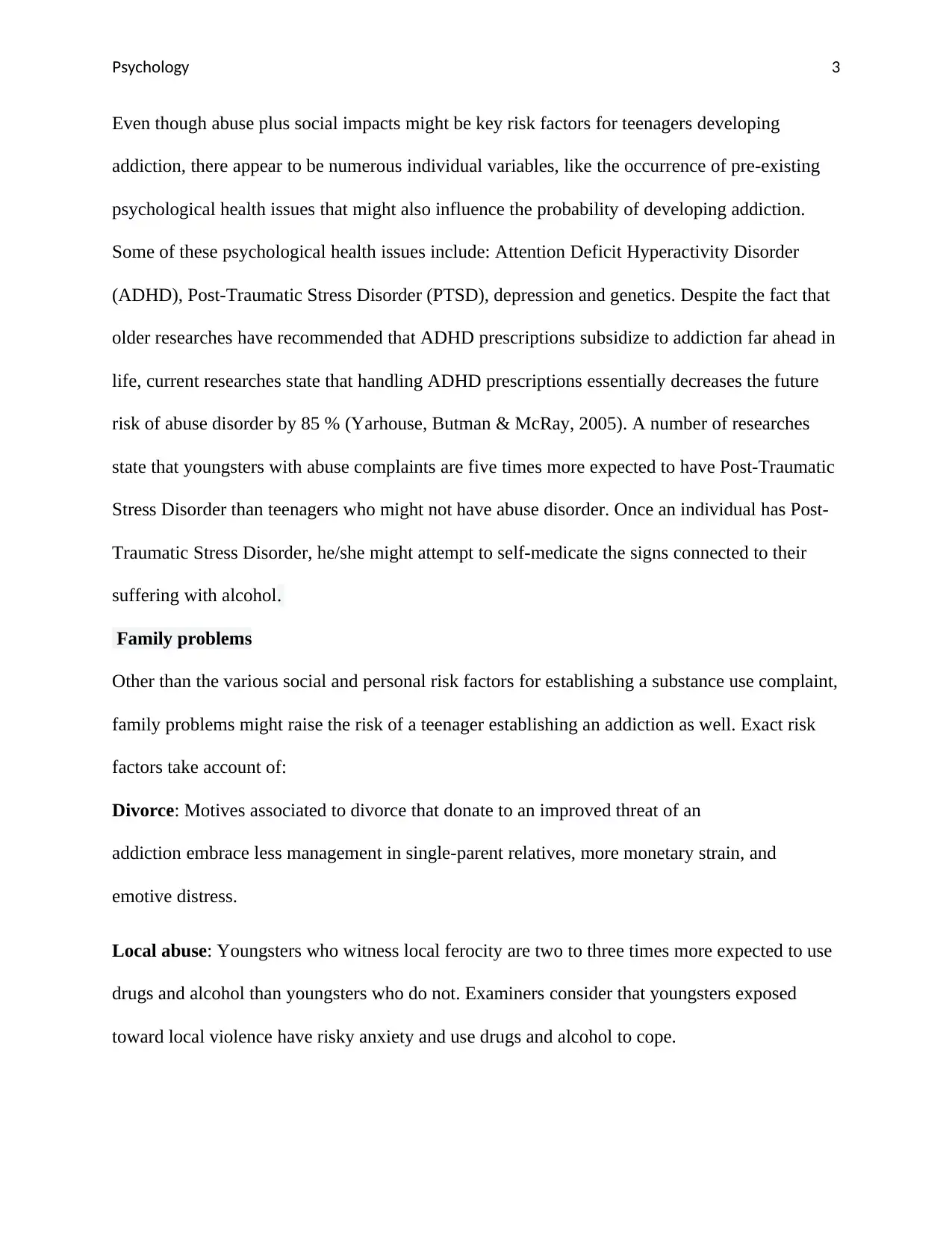
Psychology 3
Even though abuse plus social impacts might be key risk factors for teenagers developing
addiction, there appear to be numerous individual variables, like the occurrence of pre-existing
psychological health issues that might also influence the probability of developing addiction.
Some of these psychological health issues include: Attention Deficit Hyperactivity Disorder
(ADHD), Post-Traumatic Stress Disorder (PTSD), depression and genetics. Despite the fact that
older researches have recommended that ADHD prescriptions subsidize to addiction far ahead in
life, current researches state that handling ADHD prescriptions essentially decreases the future
risk of abuse disorder by 85 % (Yarhouse, Butman & McRay, 2005). A number of researches
state that youngsters with abuse complaints are five times more expected to have Post-Traumatic
Stress Disorder than teenagers who might not have abuse disorder. Once an individual has Post-
Traumatic Stress Disorder, he/she might attempt to self-medicate the signs connected to their
suffering with alcohol.
Family problems
Other than the various social and personal risk factors for establishing a substance use complaint,
family problems might raise the risk of a teenager establishing an addiction as well. Exact risk
factors take account of:
Divorce: Motives associated to divorce that donate to an improved threat of an
addiction embrace less management in single-parent relatives, more monetary strain, and
emotive distress.
Local abuse: Youngsters who witness local ferocity are two to three times more expected to use
drugs and alcohol than youngsters who do not. Examiners consider that youngsters exposed
toward local violence have risky anxiety and use drugs and alcohol to cope.
Even though abuse plus social impacts might be key risk factors for teenagers developing
addiction, there appear to be numerous individual variables, like the occurrence of pre-existing
psychological health issues that might also influence the probability of developing addiction.
Some of these psychological health issues include: Attention Deficit Hyperactivity Disorder
(ADHD), Post-Traumatic Stress Disorder (PTSD), depression and genetics. Despite the fact that
older researches have recommended that ADHD prescriptions subsidize to addiction far ahead in
life, current researches state that handling ADHD prescriptions essentially decreases the future
risk of abuse disorder by 85 % (Yarhouse, Butman & McRay, 2005). A number of researches
state that youngsters with abuse complaints are five times more expected to have Post-Traumatic
Stress Disorder than teenagers who might not have abuse disorder. Once an individual has Post-
Traumatic Stress Disorder, he/she might attempt to self-medicate the signs connected to their
suffering with alcohol.
Family problems
Other than the various social and personal risk factors for establishing a substance use complaint,
family problems might raise the risk of a teenager establishing an addiction as well. Exact risk
factors take account of:
Divorce: Motives associated to divorce that donate to an improved threat of an
addiction embrace less management in single-parent relatives, more monetary strain, and
emotive distress.
Local abuse: Youngsters who witness local ferocity are two to three times more expected to use
drugs and alcohol than youngsters who do not. Examiners consider that youngsters exposed
toward local violence have risky anxiety and use drugs and alcohol to cope.
⊘ This is a preview!⊘
Do you want full access?
Subscribe today to unlock all pages.

Trusted by 1+ million students worldwide
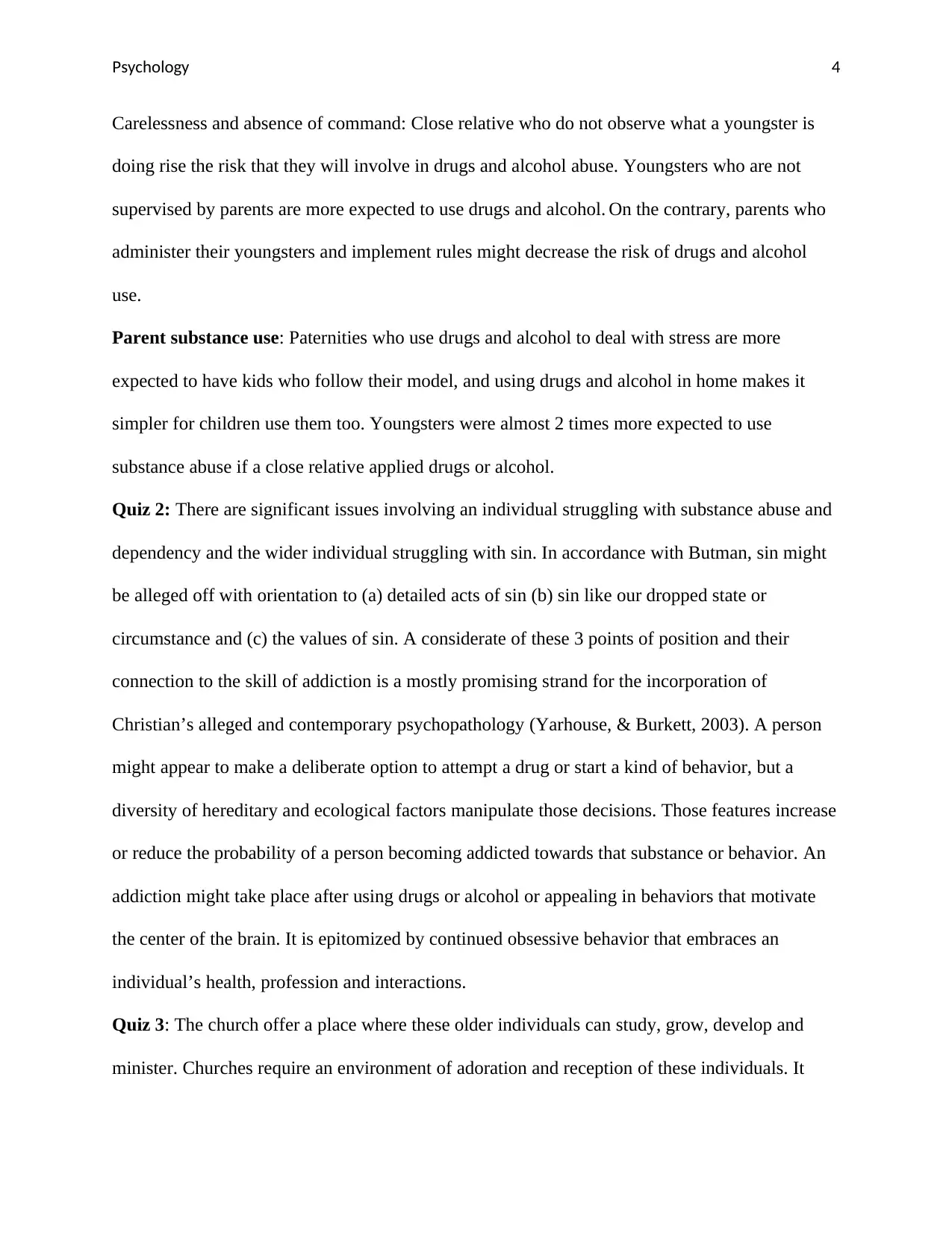
Psychology 4
Carelessness and absence of command: Close relative who do not observe what a youngster is
doing rise the risk that they will involve in drugs and alcohol abuse. Youngsters who are not
supervised by parents are more expected to use drugs and alcohol. On the contrary, parents who
administer their youngsters and implement rules might decrease the risk of drugs and alcohol
use.
Parent substance use: Paternities who use drugs and alcohol to deal with stress are more
expected to have kids who follow their model, and using drugs and alcohol in home makes it
simpler for children use them too. Youngsters were almost 2 times more expected to use
substance abuse if a close relative applied drugs or alcohol.
Quiz 2: There are significant issues involving an individual struggling with substance abuse and
dependency and the wider individual struggling with sin. In accordance with Butman, sin might
be alleged off with orientation to (a) detailed acts of sin (b) sin like our dropped state or
circumstance and (c) the values of sin. A considerate of these 3 points of position and their
connection to the skill of addiction is a mostly promising strand for the incorporation of
Christian’s alleged and contemporary psychopathology (Yarhouse, & Burkett, 2003). A person
might appear to make a deliberate option to attempt a drug or start a kind of behavior, but a
diversity of hereditary and ecological factors manipulate those decisions. Those features increase
or reduce the probability of a person becoming addicted towards that substance or behavior. An
addiction might take place after using drugs or alcohol or appealing in behaviors that motivate
the center of the brain. It is epitomized by continued obsessive behavior that embraces an
individual’s health, profession and interactions.
Quiz 3: The church offer a place where these older individuals can study, grow, develop and
minister. Churches require an environment of adoration and reception of these individuals. It
Carelessness and absence of command: Close relative who do not observe what a youngster is
doing rise the risk that they will involve in drugs and alcohol abuse. Youngsters who are not
supervised by parents are more expected to use drugs and alcohol. On the contrary, parents who
administer their youngsters and implement rules might decrease the risk of drugs and alcohol
use.
Parent substance use: Paternities who use drugs and alcohol to deal with stress are more
expected to have kids who follow their model, and using drugs and alcohol in home makes it
simpler for children use them too. Youngsters were almost 2 times more expected to use
substance abuse if a close relative applied drugs or alcohol.
Quiz 2: There are significant issues involving an individual struggling with substance abuse and
dependency and the wider individual struggling with sin. In accordance with Butman, sin might
be alleged off with orientation to (a) detailed acts of sin (b) sin like our dropped state or
circumstance and (c) the values of sin. A considerate of these 3 points of position and their
connection to the skill of addiction is a mostly promising strand for the incorporation of
Christian’s alleged and contemporary psychopathology (Yarhouse, & Burkett, 2003). A person
might appear to make a deliberate option to attempt a drug or start a kind of behavior, but a
diversity of hereditary and ecological factors manipulate those decisions. Those features increase
or reduce the probability of a person becoming addicted towards that substance or behavior. An
addiction might take place after using drugs or alcohol or appealing in behaviors that motivate
the center of the brain. It is epitomized by continued obsessive behavior that embraces an
individual’s health, profession and interactions.
Quiz 3: The church offer a place where these older individuals can study, grow, develop and
minister. Churches require an environment of adoration and reception of these individuals. It
Paraphrase This Document
Need a fresh take? Get an instant paraphrase of this document with our AI Paraphraser
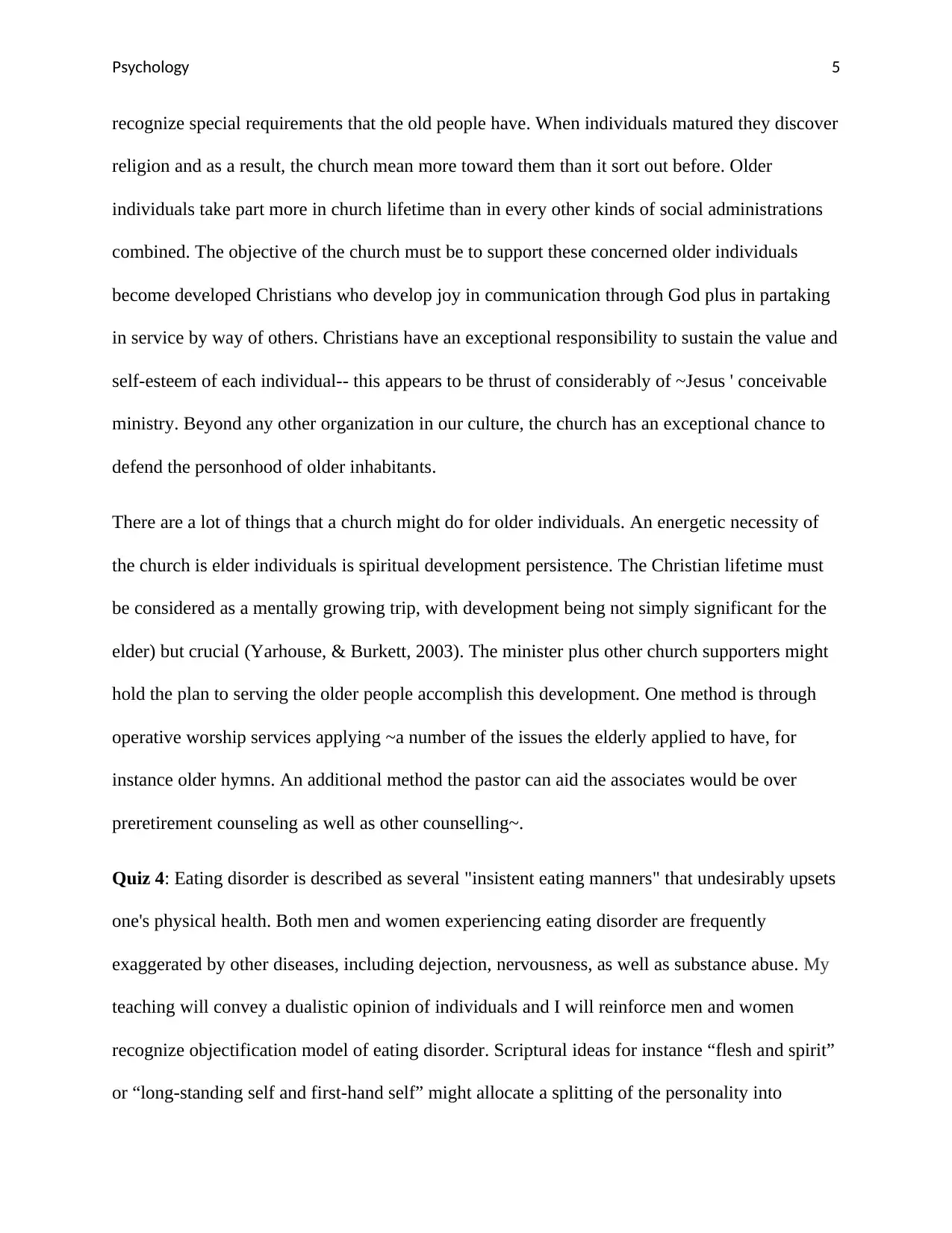
Psychology 5
recognize special requirements that the old people have. When individuals matured they discover
religion and as a result, the church mean more toward them than it sort out before. Older
individuals take part more in church lifetime than in every other kinds of social administrations
combined. The objective of the church must be to support these concerned older individuals
become developed Christians who develop joy in communication through God plus in partaking
in service by way of others. Christians have an exceptional responsibility to sustain the value and
self-esteem of each individual-- this appears to be thrust of considerably of ~Jesus ' conceivable
ministry. Beyond any other organization in our culture, the church has an exceptional chance to
defend the personhood of older inhabitants.
There are a lot of things that a church might do for older individuals. An energetic necessity of
the church is elder individuals is spiritual development persistence. The Christian lifetime must
be considered as a mentally growing trip, with development being not simply significant for the
elder) but crucial (Yarhouse, & Burkett, 2003). The minister plus other church supporters might
hold the plan to serving the older people accomplish this development. One method is through
operative worship services applying ~a number of the issues the elderly applied to have, for
instance older hymns. An additional method the pastor can aid the associates would be over
preretirement counseling as well as other counselling~.
Quiz 4: Eating disorder is described as several "insistent eating manners" that undesirably upsets
one's physical health. Both men and women experiencing eating disorder are frequently
exaggerated by other diseases, including dejection, nervousness, as well as substance abuse. My
teaching will convey a dualistic opinion of individuals and I will reinforce men and women
recognize objectification model of eating disorder. Scriptural ideas for instance “flesh and spirit”
or “long-standing self and first-hand self” might allocate a splitting of the personality into
recognize special requirements that the old people have. When individuals matured they discover
religion and as a result, the church mean more toward them than it sort out before. Older
individuals take part more in church lifetime than in every other kinds of social administrations
combined. The objective of the church must be to support these concerned older individuals
become developed Christians who develop joy in communication through God plus in partaking
in service by way of others. Christians have an exceptional responsibility to sustain the value and
self-esteem of each individual-- this appears to be thrust of considerably of ~Jesus ' conceivable
ministry. Beyond any other organization in our culture, the church has an exceptional chance to
defend the personhood of older inhabitants.
There are a lot of things that a church might do for older individuals. An energetic necessity of
the church is elder individuals is spiritual development persistence. The Christian lifetime must
be considered as a mentally growing trip, with development being not simply significant for the
elder) but crucial (Yarhouse, & Burkett, 2003). The minister plus other church supporters might
hold the plan to serving the older people accomplish this development. One method is through
operative worship services applying ~a number of the issues the elderly applied to have, for
instance older hymns. An additional method the pastor can aid the associates would be over
preretirement counseling as well as other counselling~.
Quiz 4: Eating disorder is described as several "insistent eating manners" that undesirably upsets
one's physical health. Both men and women experiencing eating disorder are frequently
exaggerated by other diseases, including dejection, nervousness, as well as substance abuse. My
teaching will convey a dualistic opinion of individuals and I will reinforce men and women
recognize objectification model of eating disorder. Scriptural ideas for instance “flesh and spirit”
or “long-standing self and first-hand self” might allocate a splitting of the personality into
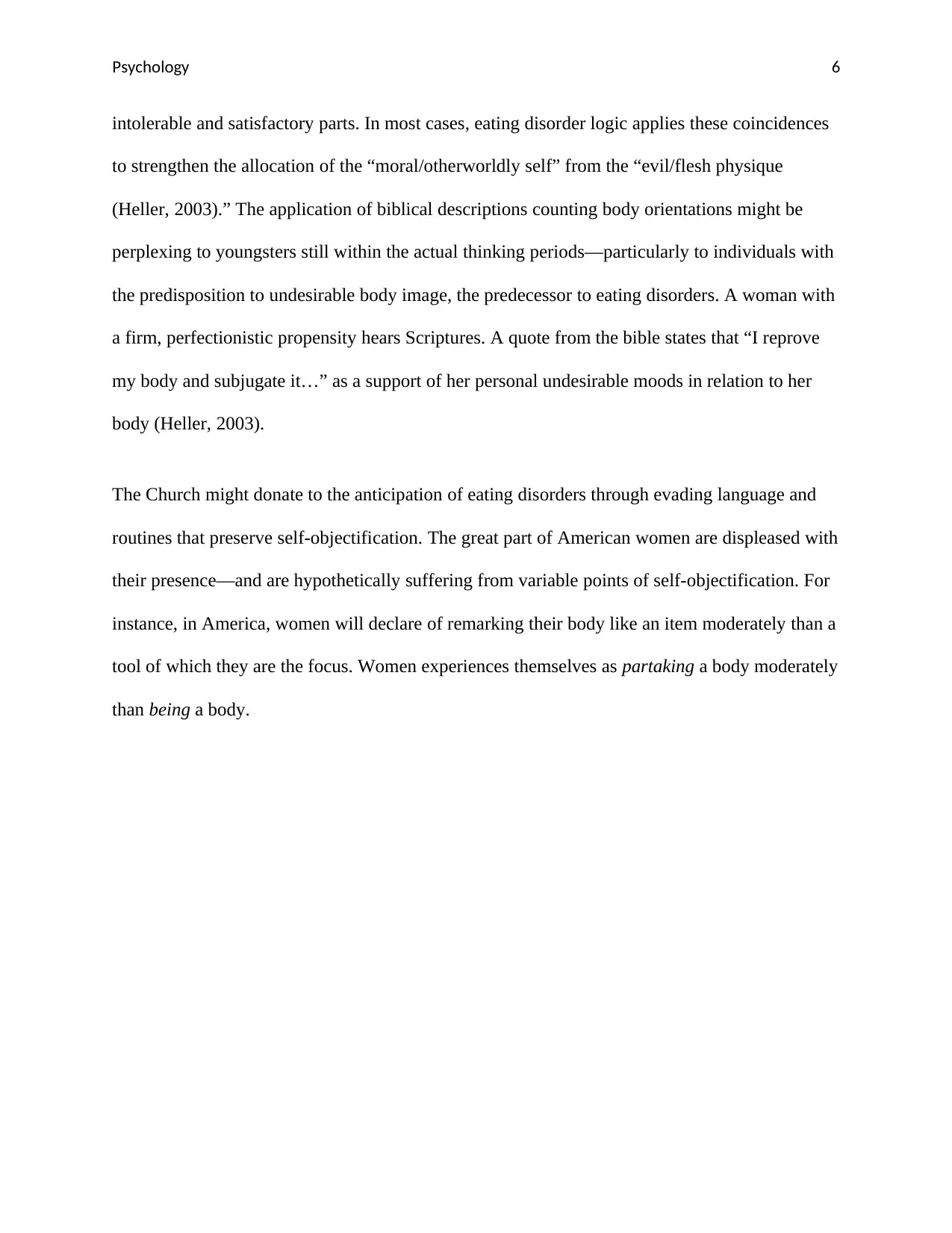
Psychology 6
intolerable and satisfactory parts. In most cases, eating disorder logic applies these coincidences
to strengthen the allocation of the “moral/otherworldly self” from the “evil/flesh physique
(Heller, 2003).” The application of biblical descriptions counting body orientations might be
perplexing to youngsters still within the actual thinking periods—particularly to individuals with
the predisposition to undesirable body image, the predecessor to eating disorders. A woman with
a firm, perfectionistic propensity hears Scriptures. A quote from the bible states that “I reprove
my body and subjugate it…” as a support of her personal undesirable moods in relation to her
body (Heller, 2003).
The Church might donate to the anticipation of eating disorders through evading language and
routines that preserve self-objectification. The great part of American women are displeased with
their presence—and are hypothetically suffering from variable points of self-objectification. For
instance, in America, women will declare of remarking their body like an item moderately than a
tool of which they are the focus. Women experiences themselves as partaking a body moderately
than being a body.
intolerable and satisfactory parts. In most cases, eating disorder logic applies these coincidences
to strengthen the allocation of the “moral/otherworldly self” from the “evil/flesh physique
(Heller, 2003).” The application of biblical descriptions counting body orientations might be
perplexing to youngsters still within the actual thinking periods—particularly to individuals with
the predisposition to undesirable body image, the predecessor to eating disorders. A woman with
a firm, perfectionistic propensity hears Scriptures. A quote from the bible states that “I reprove
my body and subjugate it…” as a support of her personal undesirable moods in relation to her
body (Heller, 2003).
The Church might donate to the anticipation of eating disorders through evading language and
routines that preserve self-objectification. The great part of American women are displeased with
their presence—and are hypothetically suffering from variable points of self-objectification. For
instance, in America, women will declare of remarking their body like an item moderately than a
tool of which they are the focus. Women experiences themselves as partaking a body moderately
than being a body.
⊘ This is a preview!⊘
Do you want full access?
Subscribe today to unlock all pages.

Trusted by 1+ million students worldwide
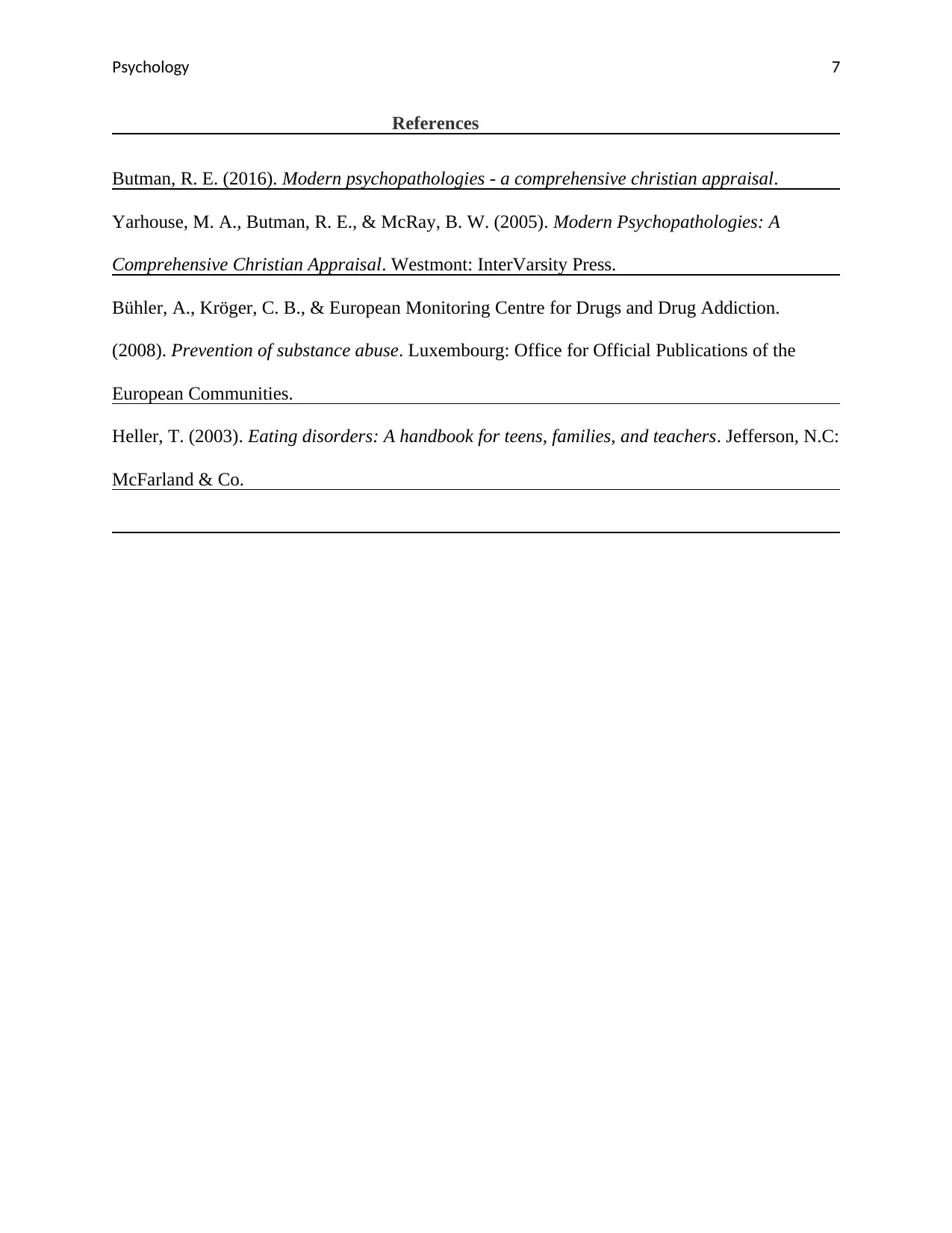
Psychology 7
References
Butman, R. E. (2016). Modern psychopathologies - a comprehensive christian appraisal.
Yarhouse, M. A., Butman, R. E., & McRay, B. W. (2005). Modern Psychopathologies: A
Comprehensive Christian Appraisal. Westmont: InterVarsity Press.
Bühler, A., Kröger, C. B., & European Monitoring Centre for Drugs and Drug Addiction.
(2008). Prevention of substance abuse. Luxembourg: Office for Official Publications of the
European Communities.
Heller, T. (2003). Eating disorders: A handbook for teens, families, and teachers. Jefferson, N.C:
McFarland & Co.
References
Butman, R. E. (2016). Modern psychopathologies - a comprehensive christian appraisal.
Yarhouse, M. A., Butman, R. E., & McRay, B. W. (2005). Modern Psychopathologies: A
Comprehensive Christian Appraisal. Westmont: InterVarsity Press.
Bühler, A., Kröger, C. B., & European Monitoring Centre for Drugs and Drug Addiction.
(2008). Prevention of substance abuse. Luxembourg: Office for Official Publications of the
European Communities.
Heller, T. (2003). Eating disorders: A handbook for teens, families, and teachers. Jefferson, N.C:
McFarland & Co.
1 out of 7
Related Documents
Your All-in-One AI-Powered Toolkit for Academic Success.
+13062052269
info@desklib.com
Available 24*7 on WhatsApp / Email
![[object Object]](/_next/static/media/star-bottom.7253800d.svg)
Unlock your academic potential
Copyright © 2020–2026 A2Z Services. All Rights Reserved. Developed and managed by ZUCOL.




